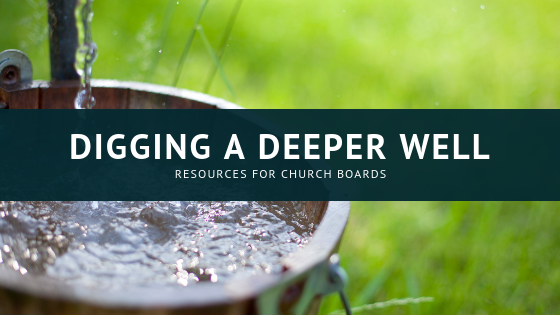None of us come to church – not on Sundays and certainly not on the random weeknight – only as the “role” we play: usher, choir member, mission volunteer, board member. A church board gathers on the third Tuesday of the month. Coming into the room is the woman who is preoccupied with the call earlier in the day from her father’s assisted nursing unit. Taking a seat at the table is the woman who just had a tense discussion with her spouse about long-simmering issues. She is now next to the man who just finished a phone call with his teenaged son about use of the car, and they are both seated across from the only 20-something in the room who just got a late notice on her student loans.
Church boards work when they recognize the whole persons who gather at their table—whole persons with worries, doubts, joys, anticipations, frustrations, and conflicts. Then, and only then, can a board become a community of faith that seeks to follow God’s will for their congregation. Getting from here to there is a priority for life together as a church board. Rather than “putting aside” the particularities of our lives, let’s be specific about the dents and potholes of our lives. The call here, though, is not to turn every month’s meeting into a group therapy session. It is to learn to pray with specificity with one another.
Todd Davis’ poem, “Prayer Requests at a Mennonite Church” (from his book, Some Heaven, Michigan State University Press, 2007), is a model of specific prayer. In five stanzas, the poem invites us, as prayer request time in worship invites us, to pray for those who have lost sons in farm accidents, for a daughter who has left the church, for a family who experienced a stillbirth, and for a son who is fighting in a war. This poem-as-prayer is not vague or sentimental. It is notable in its details, its expression of repentance, and its discernment about how far away we are from God’s new heaven and new earth, as in the final stanza:
Pray for the Stutzman Family,
their son fights in the war.
We call him back to the Prince of Peace,
to our Savior who knelt to gather the slave’s ear,
brushed the dirt away,
lifted it to the side of his fleshed face.
May we leave no scars.
May we ask no blessing for the killing done in his name.
Indeed, a reflection on Davis’ poem might well be paired with Philippians 4:4-7, which implores us not to separate our prayers from the “business” we have to transact in church mid-week:
4 Rejoice[c] in the Lord always; again I will say, Rejoice. 5 Let your gentleness be known to everyone. The Lord is near. 6 Do not worry about anything, but in everything by prayer and supplication with thanksgiving let your requests be made known to God. 7 And the peace of God, which surpasses all understanding, will guard your hearts and your minds in Christ Jesus.
Philippians 4:4-7 should not just be an uplifting verse read in the five minute “devotions” that begins many church meetings. It should be our guiding principle for meetings, much more than “Robert’s Rules of Order.”
Let your requests be made known to God.
Together.
As a church board.
Every month.
Through prayer and thanksgiving.








No Comments